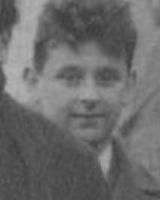Maximilian Herzberger
Maximilian Jacob Herzberger | |
|---|---|
 At the visitors' conference of the Mathematical Society Jena, Oct 1930 | |
| Born | March 17, 1899 Berlin, Germany |
| Died | April 9, 1982 (aged 83) New Orleans, Louisiana, US |
| Citizenship | United States |
| Alma mater | Berlin University |
| Known for | Superachromat lens |
| Spouse | Edith Kaufmann |
| Children | Ruth (1928), Ursula Bellugi (1931), Hans (1932) |
| Awards | Cressy Morrison Award (NYAS 1945), Frederic Ives Medal (OSA 1962) |
| Scientific career | |
| Thesis | Ueber Systeme hyperkomplexer Grössen (1923) |
| Doctoral advisors | Ludwig Bieberbach, Issai Schur |
Maximilian Jacob Herzberger (7 or 17 Mar 1899, Berlin, Germany — 9 Apr 1982, New Orleans, United States)[1][2] was a German-American mathematician and physicist, known for his development of the superachromat lens.
Life
[edit]Maximilian Herzberger was the son of Leopold Herzberger (born 7 Mar 1870, Krefeld — died in Rochester (NY)) and Sonja/Sofia Behrendt/Berendt/Berends (22 Mar 1876, Petersburg (Germany)[clarification needed] — 28 Jan 1945, Florence); he had a sister Olga (24 Sep 1897, Berlin — 2 Aug 1922, Berlin). The family was Jewish.[3] He studied mathematics and physics at the Berlin University, where Albert Einstein was one of his professors, and later became a friend and advisor.[4]: 57r In 1923, Herzberger finished his Ph.D. thesis Ueber Systeme hyperkomplexer Grössen under Ludwig Bieberbach and Issai Schur at the philosophical faculty.[5] In 1925, he married Edith Kaufmann (10 Oct 1901, Stuttgart — 16 Feb 2001, Carlsbad (California) or New Orleans); they had three children, born in Jena, viz. Ruth (born 1928), Ursula Bellugi (1931), and Hans (6 Aug 1932, spouse of Radhika Herzberger).[1][2] No later than Sep 1930, he was assistant of Hans Boegehold,(de) the chief of calculation office at Carl Zeiss Jena.[6]
In 1934, the Nazis deprived him from his professorship at Jena University and his contract with Zeiss. Leaving Germany with a "total of $10 in my pockets".[4], he went initially to the Netherlands, where he was hosted by the Dutch physicist A.C.S. van Heel.[7] After the Nazi occupation of the Netherlands, he emigrated with his family to Rochester (NY),[6] where he became head of Eastman Kodak's optical research laboratories, arranged by Einstein.[4]: 57r In 1940, he and his family became U.S. citizens.[4]: 58l In 1945, he got the Cressy Morrison Award of the New York Academy of Sciences.[4]: 57l
In 1954 he finished the development of the superachromat as the ultimately well-corrected lens for Kodak.[4]: 58m [8] In 1962, he was awarded the Frederic Ives Medal of the Optical Society of America.[9][10] In 1965, he retired from his position at Kodak, and helped building a graduate institute for optics in Switzerland,[4]: 58r until in 1968 he followed invitation of the University of New Orleans to teach at their Physics Department.[4]: 57m, 58r [6]
He held patents for an "apochromatic telescope objective having three air spaced components",[11] and a "superachromatic objective".[12]
Publications
[edit]- Ueber Systeme hyperkomplexer Grössen, Max Herzberger, Berlin, 1923, Ebering.
- Untersuchungen über die Eigenschaften erster Ordnung von reellen Strahlensystemen, Jan 1928, De Gruyter, ISBN 9783111279886
- Untersuchungen über die Eigenschaften erster Ordnung von reellen Strahlensystemen, in: Journal für die reine und angewandte Mathematik, Vol.159, p. 36-49, 1928
- Über die geometrische Bedeutung des Rotationswinkels in der Strahlengeometrie, Jan 1928, De Gruyter, ISBN 9783111095615
- Über die geometrische Bedeutung des Rotationswinkels in der Strahlengeometrie, in: Journal für die reine und angewandte Mathematik, Vol.160, p. 33-37, 1929
- Gullstrand, Allvar, Complete Dictionary of Scientific Biography, 2008
- M. Herzberger, Allvar Gullstrand, in Optica Acta, Vol.3 (1960), p. 237–241
References
[edit]- ^ Jump up to: a b Record at geni.com, and related records
- ^ Jump up to: a b Person sheet at goudsmit.home.xs4all.nl
- ^ Maximilian Jacob Herzberger
- ^ Jump up to: a b c d e f g h Lorena Dureau, Einstein's Protege, p.56-58, Sep.???? (1970 or after)
- ^ Record at Humboldt University Berlin
- ^ Jump up to: a b c Catalog entry at medicusbooks.com, about a common letter of Boegehold and Herzberger to Erwin Lihotzky at the Ernst Leitz GmbH
- ^ Inscription in first edition "Modern Geometrical Optics" found in A.C.S. van Heel's library: "To my friend A.C.S van Heel, who so generously helped me, when I had to flee Nazi Germany, Max Herzberger".
- ^ Herzberger, M., and N. McClure, The design of superachromatic lenses, Appl. Opt. Vol.2, pp. 553–560 (June 1963)
- ^ Maximilian J. Herzberger Frederic Ives Medalist for 1962, JOSA, Vol. 53, Issue 6, pp. 657-657 (1963)
- ^ "Frederic Ives Medal / Quinn Prize - Awards - OSA.org | The Optical Society". osa.org. Retrieved 2015-02-14.
- ^ Oct. 1946 with Harvey O Hoadley, US 2487873 at google patents
- ^ May 1965 with Nancy R Mcclure, US 3395962 at google patents
External links
[edit]- Homage to an immortal KUBRICK AND THE LEGENDARY PLANAR 50mm f / 0.7, about a camera objective based on a 1937 draft by Herzberger, and used by Stanley Kubrick for his film "Barry Lyndon"
